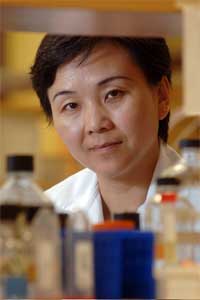 |
| Dr. Jun Wang: "There are lots of advantages to needle-free delivery." (Abriel photo) |
Nasal sprays are a common tool in the fight against runny noses and allergies. But can they be effective in preventing infectious disease as well?
ThatĆs the question that Dr. Jun Wang is posing. She is working on developing the first-ever vaccine against chlamydia.Ā AĀ common sexually transmitted infection,Ā chlamydia has many strains that can affect the eyes and lungs. It is troublesome because it can go undetected and untreated for years before it becomes symptomatic. Dr. Wang is hoping to create a preventative vaccine against chlamydia in the form of a nasal spray.
ĆThere are lots of advantages to needle-free delivery,ā she says. ĆNeedles are expensive and troublesome, in that they usually require health professionals to administer them. A nasal vaccine would provide targeted immunity without these drawbacks.ā
Because the nose contains mucosal sites, the hope is that a nasal vaccine can be developed that generates immunity throughout the body.
Today, the Canadian Foundation for Innovation announced $26 million for investments in Canadian research, with Dr. Wang receiving $125,000 towards the development of her mucosal immunology and vaccinology research laboratory. This is the second major funding announcement from the CFI in as many months; in June, nine »ĘÉ«Ö±²„ researchers were awarded a total of $1.13 million through the Leadership Opportunity Fund, the same fund from which Dr. Wang and two other »ĘÉ«Ö±²„ researchers are to receive awards.
Two other CFI-supported projects
In related nose news, Dr. Remigius Agu received $123,236 in funding to continue his significant contributions to the science of nasal drug delivery. The money will be used for important improvements to his laboratory, the only lab in Canada dedicated to the subject. His funding will also receive matching funds from the Nova Scotia Research and Innovation Trust and the Faculty of Health Professions.
And less nosy but no less newsworthy, Dr. Margaret Walsh with the Department of Civil and Resource Engineering has received $124,134 for her research into advanced process design in water and wastewater treatment. With municipalities looking to explore ways of meeting and exceeding new water quality treatments without raising the cost of water to domestic and industrial consumers, her research into colloidal and surface science will help develop better strategies and guidelines for emerging water treatment technologies and designs.
